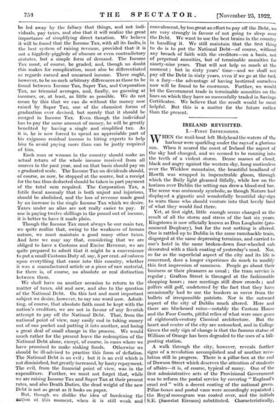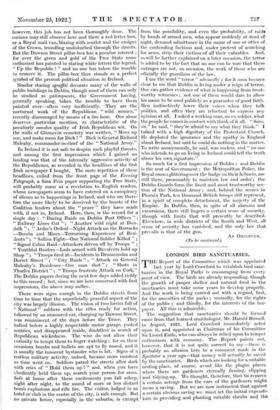IRELAND REVISITED.
I.—FIRST IMPRESSIONS.
HEN the mail-boat left Holyhead the waters of the harbour were sparkling under the rays of a glorious sun. When it neared the coast of Ireland the aspect of the sky had changed, and we seemed to be running into the teeth of a violent storm. Dense masses of cloud, black and angry against the western sky, hung motionless over the Wicklow mountains, the beautiful headland of Howth was wrapped in impenetrable gloom, through which the Baily light gleamed fitfully, while low on the horizon over Dublin the setting sun drew a blood-red bar. The scene was ominously symbolic, as though Nature had displayed a gigantic and wonderfully beautiful sky-sign to warn those who should venture into that lovely land of what they would find there.
Yet, at first sight, little enough seems changed as the result of all the storm and stress of the last six years. Kingstown is now officially known as Dun Laoghaire (pro- nounced Dunleary), but for the rest nothing is altered. One is rattled up to Dublin in the same ramshackle train, disgorged at the same depressing terminus, and carried to one's hotel in the same broken-down four-wheeled cab decorated with a thick coating of yesterday's mud. Nor, so far as the superficial aspect of the city and its life is concerned, does a longer experience do much to modify this first impression of sameness. People go about their business or their pleasures as usual ; the tram service is regular ; Grafton Street is thronged at the fashionable shopping hours ; race meetings still draw crowds ; and golfers still golf, undeterred by the fact that they have occasionally had to use the bunkers as cover from the bullets of irresponsible patriots. Nor is the outward aspect of the city of Dublin much altered. Here and there are blackened ruins—notably the Custom House and the Four Courts, pitiful relics of what were once gems of eighteenth-century Classical architecture. But the heart and centre of the city are untouched, and in College Green the only sign of change is that the famous statue of William of Orange has been degraded to the uses of a bill- posting station.
A walk through the city, however, reveals further signs of a revolution accomplished and of another revo- lution still in progress. There is a pillar-box at the end of Dawson Street which deserves the attention of students of affairs—it is, of course, typical of many. One of the first administrative acts of the Provisional Government was to reform the postal service by covering " England's cruel red " with a decent coating of the national green. Pillar-boxes and postal vans were accordingly repainted ; the Royal monogram was coated over, and the initials S.E. (Saorstat Eireann) substituted. Characteristically, however, this job has not been thoroughly done. The curious may still observe here and there a red letter-box, or a Royal mail van, blazing with scarlet and the ensigns of the Crown, trundling undisturbed through the streets. But the Dawson Street pillar-box has a peculiar interest ; for over the green and gold of the Free State some enthusiast has painted in staring white letters the legend, " Up the Republic ! " and no one has taken the trouble to remove it. The pillar-box thus stands as a perfect symbol of the present political situation in Ireland.
Similar staring sgraffiti decorate many of the walls of public buildings in Dublin, though most of them can only be studied as palimpsests, the Government having, generally speaking, taken the trouble to have them painted over—often very inefficiently. They are the nocturnal work of the Republican " wild women," recently discouraged by means of a fire-hose. One alone deserves particular mention, as characteristic of the peculiarly macabre quality of Irish Republican wit. On the walls of Glasnevin cemetery was written, " Move up one, and make room for Dick " Dick is General Richard Mulcahy, commander-in-chief of the " National Army."
In Ireland it is not safe to despise such playful threats, and among the first impressions which I gained on landing was that of the intensely aggressive activity of the Republicans, as revealed in the headlines of the first Irish newspaper I bought. The mere repetition of these headlines, culled from the front page of the Evening Telegraph, a Sinn Fein paper supporting the Free State, will probably come as a revelation to English readers, whose newspapers seem to have entered on a conspiracy of silence as to happenings in Ireland, and who are there- fore the more likely to be deceived by the boasts of the Coalition leaders about the " peace " they have made with, if not in, Ireland. Here, then, is the record for a single day : " Daring Raids on Dublin Post Offices " ; " Railway Lines Cut " ; " Another wild night at Dun- dalk " ; " Ardee's Ordeal—Night Attack on the Barracks —Bombs and Mines—Terrorising Experience of Resi- dents " ; " Sallins Fight—One National Soldier Killed " ; " Signal Cabin Raid—Attackers driven off by Troops " ; " Youthful Raiders—Lads armed with Revolvers hold up Shop " ; " Troops fired at—Incidents in Drumcondra and Dorset Street " ; " City Raids " ; " Attack on General Mulcahy's Residence—One man shot " ; " Shots in Thurles District " ; " Troops frustrate Attack on Cork." The Dublin papers during the next few days added richly to this record ; but, since we are here concerned with first impressions, the above may suffice.
There were signs enough in the Dublin streets from time to time that the superficially peaceful aspect of the city was largely illusion. The vision of two lorries full of " National " soldiers with the rifles ready for action, followed by an armoured car, charging up Dawson Street, was reminiscent of the days before the Truce. They halted before a highly respectable motor garage, posted sentries, and disappeared inside, doubtless in search of Republican wickedness. The wise do not allow their curiosity to tempt them to linger watching ; for on these occasions bombs and bullets are apt to fly round, and it is usually the innocent bystander who is hit. Signs of a restless military activity, indeed, became more insistent as time went on. Soldiers patrol the streets after dark with cries of " Hold them up I " and, when you have obediently held them up, search your person for arms. Safe at home after these excitements you fall asleep, night after night, to the sound of more or less distant bomb explosions and rifle fire. The visitor, lodged in an hotel or club in the centre of the city, is safe enough. But no private house, especially in the suburbs, is exempt from the possibility, and even the probability, of raids by bands of armed men, who appear 'suddenly at dead of night, demand admittance in the name of one or otker of the contending factions and, under pretext of searching for arms, strip their victims of all their valuables. And, as will be further explained on a later occasion, the terror is added to by the fact that no one can be sure that these outrages are not, on occasion, the work of those who are officially the guardians of the law.
I use the word " terror " advisedly ; for it soon became clear to me that Dublin is living under a reign of terror. One can gather evidence of what is happening from trust- worthy witnesses ; not one of them would dare to allow his name to be used publicly as a guarantee of good faith. Men instinctively lower their voices when they talk politics, and often they are reluctant to express any opinion at all. I asked a working man, an ex-soldier, what the people he comes in contact with think of it all. " Sure, sir," he said, " they're afraid to say what they think." I talked with a high dignitary of the Protestant Church. He deplored the ignorance and the apathy in England about Ireland, but said he could do nothing in the matter. To write anonymously, he said, was useless, and " no one who intends to go on living in Ireland could tell the truth above his own signature."
So much for a first impression of Dublin ; and Dublin is the seat of Government ; the Metropolitan Police, the Royal crown glittering over the badge on their helmets, arc still there, presumably to maintain law and order ; the Dublin Guards form the finest and most trustworthy sec- tion of the National Army ; and, behind the scenes in Phoenix Park, ten thousand British troops still represent, in a spirit of complete detachment, the majesty of the Empire. In Dublin, then, in spite of all alarums and excursions, there still lingers a certain sense of security, though with limits that will presently be described. Elsewhere, in wide districts of the South and West, all sense of security has vanished, and the only law that prevails is that of the gun.
(To. be continued.)
AN OBSERVER.











































 Previous page
Previous page